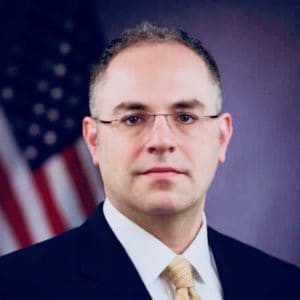Representatives from the three bodies policing securities in the US and the Chief Strategy Officer from the Bittrex cryptocurrency exchange spoke on an “Enforcement” panel May 15 at the Consensus conference in New York.
Citing an “open door” policy, the regulators- James McDonald, Director of Enforcement, Commodity Futures Trading Commission; Robert A. Cohen, Chief- Cyber Unit, SEC Division of Enforcement; and Sujit Raman, Associate Deputy Attorney General, U.S. Department of Justice- seemed to politely take issue with the idea forwarded by Kiran Raj of Bittrex that they have left tech companies issuing ICOs in the dark regarding what is and is not a security.
Happening now— #Consensus2018 Enforcement Panel: Kiran Raj, @BittrexExchange Chief Strategy Officer, and officials from the @SEC_News, @CFTC and @TheJusticeDept are discussing the regulatory landscape for blockchain. pic.twitter.com/ycrX6MuIcI
— Bittrex (@BittrexExchange) May 15, 2018
Raj, formerly senior counsel to the Deputy Attorney General at the US Department of Justice and now at Bittrex told the other panelists and the audience that: “People (looking at issuing ICOs) wanna do the right thing…(and be) compliant…with the regulatory regimes… but there’s a lot of uncertainty…as to what those are…”
“A lot of this technology is very new,” said Raj. “It doesn’t fit into nice neat boxes that we’ve had…that have grown up from the 1940’s to the present…A lot in the industry feel that we need more guidance…The main mission of these three agencies is about fraud…but if you are trying to do the right thing…how does that map on to what (regulators are) doing?”
The CFTC’s McDonnald said that their project “Lab CFTC” has been travelling around the country meeting with innovators and doing outreach. “We’re careful not to be (about enforcement)…I appreciate that there is some sense that more guidance would be useful, but I also think…that folks should recognize…our doors are open…(T)he policy divisions are having those meetings with market participants where I think they are making it very clear what the CFTC’s position is.”
 The SEC’s Cohen also claimed an open door policy at the Commission via its Fintech Mailbox at Fintec@SEC.gov. “Anybody can use that to submit questions or request a meeting…it really is a two way conversation…”
The SEC’s Cohen also claimed an open door policy at the Commission via its Fintech Mailbox at Fintec@SEC.gov. “Anybody can use that to submit questions or request a meeting…it really is a two way conversation…”
“Government can’t give legal advice but they can let you know what the regulations are and help you decide how they apply to a specific idea that you have,” said Cohen.
Moderator Steve Bunnel, who is working as the Interim Chief Legal Officer at Bittrex cryptocurrency exchange brought up the importance of good faith when interacting with regulators. “I know that in the enforcement world, good faith matters,” he said.
“Absolutely,” confirmed Cohen, stating that regulators appreciate when companies help them conserve limited resources at the Commission. “Enforcement investigations are carefully selected,” said Cohen. “The main issue here is whether the token is a security,” added Cohen, who said the SEC has published clear guidelines to that effect.
Sujit Raman of the Department of Justice said one of their main concerns is, “We don’t know who is using these (cryptocurrencies).” Exchanges doing proper KYC (Know Your Customer procedures) is, therefore, “a welcome thing for us.”
All the agencies expressed explicit mandates to facilitate markets as well as protect participants. “We don’t want to just push…legitimate business offshore…” said Cohen, but his agency is also concerned with protecting particularly retail investor’s “hard-earned money”:
“Strong investor protection is part of what makes American markets so strong…and striking the balance,” between innovation and investor protection, “is very important.”
MacDonald of the CFTC admitted that his job involved significant complexities:
“These different markets cut across a number of different jurisdictions, not just civil and criminal…it is incumbent upon us as regulators that we coordinate our efforts…Our goal is to have a coherent and cohesive approach to regulation and enforcement where there are decisions made on the front end…We wanna be sure that at the same time that we’re facilitating market enhancements in this area…we’re cracking down on wrongdoers who are trying to take advantage of that….enthusiasm…happening in this space.”
 MacDonald noted the same old styles of fraud migrating into new crypto / ICO markets:
MacDonald noted the same old styles of fraud migrating into new crypto / ICO markets:
“One of the things that we see is the same kinds of fraudulent conduct being applied to these markets that historically (were) applied to precious metals or foreign currency or binary options. We just filed a case where the allegations is that it started as a binary options fraud and then morphed into a cryptocurrency fraud.”
Moderator Bunnell asked about enforcement trends in the US over the next six-to-twelve twelve months, and the SEC’s Cohen was far from sanguine:
“Unfortunately we think that there is a real significant risk of fraud in this area as there is with any area of new and exciting technology for investors who are excited about the opportunity to invest…You’ll continue to see us very focussed on fraud cases, especially ongoing frauds, especially those affecting retail investors where retail investors have handed over millions of dollars…and that money’s at risk…”
Cohen reiterated the idea that sufficient regulation already governs these sectors and that the SEC has tabled sufficient guidance for the industry to get its bearings:
“The Dao report not even a year old…put out that guidance making it clear that digital assets often are securities…We brought an enforcement case in the fall……the company cooperated significantly and we recognize that…For the firms that have seen the guidance and seen the case and continue to not make a good faith effort to comply, I think we’re going to continue to be focussed on that area as well…And then finally the supporting infrastructure as well, the broker/dealers or promotors or what not…that are not being mindful of the laws…we’re gonna be focussed on that as well.”
 The SEC, according to Cohen, will continues to lean heavily on the Howey Test established by the US Supreme Court in 1933:
The SEC, according to Cohen, will continues to lean heavily on the Howey Test established by the US Supreme Court in 1933:
“The Howey analysis…that explains what is a security, as much as the industry has changed in the decades, the concept is pretty straightforward, which is…if a person is raising money for a business…and people are giving money to that person with the hope that if they’re successful, they’re gonna make a profit off the efforts of others, that’s a security…that’s…the core concept.”
The moderator wrapped up by asking Kiran Raj of Bittrex, “Have you got any observations on behalf of the entire private sector?”
“Get a lawyer,” said Raj. “It’s complicated.”


